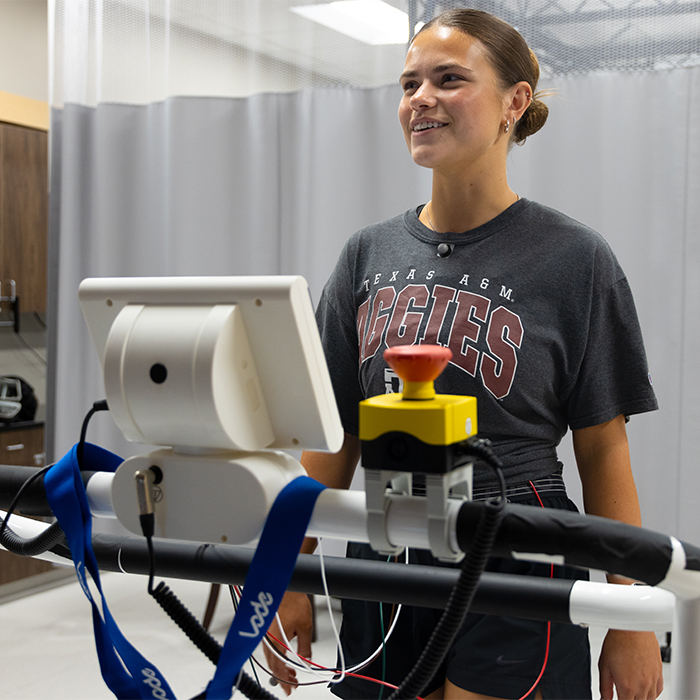Doctor of Philosophy in Kinesiology, emphasis in:
Motor Neuroscience
Our curriculum is experimentally oriented and is specifically designed to provide students with a thorough foundation in the theoretical processes that assist the performance and learning of perceptual-motor skills, along with statistics, research methods, and research design. In collaboration with the student’s advisory committee, plans of study are catered to each individual.
Plans of study are diverse and flexible, allowing classes and experiences to be individualized to each student’s background, goals, and interests. Specific areas of research focus correspond to those listed for the motor neuroscience faculty.
A member of the graduate faculty to be admitted must accept students.

Curriculum
Curriculum
Laboratories & Collaborative Experiences
Laboratories of this emphasis area support related motor neuroscience disciplines including motor control, motor learning, motor development, and biomechanics. These laboratories provide the most modern facilities and use technologies that allow online data collection and processing, sophisticated presentation of auditory and visual stimuli, state-of-the-art brain stimulation and imaging, and the opportunity to conduct research using human and animal models.
The multi-disciplinary nature of work conducted in our laboratories provides our students with outstanding collaborative, supplemental experiences. Faculty are consistently searching for additional collaborative experiences for students, and new opportunities become available regularly. A few of our current collaborative experiences include:
- Electrical engineering (robotics)
- Computer science (artificial intelligence, digital twin)
- Industrial engineering (human factors)
- Aerospace engineering (performance)
- Psychology
- Neuroscience/College of Medicine
- Environmental and Occupational Health (ergonomics)
- Visualization (biofeedback, augmented virtual reality)
- Texas A&M Athletics
- Community and industry partners including NASA and nonprofits
Texas A&M University has dedicated research support including a Human Clinical Research Building, numerous core facilities, and internal funding mechanisms to support student research. In addition to the numerous resources provided by the department, Texas A&M University Graduate and Professional School hosts extensive professional development opportunities including GRAD Aggies, mentoring programs, Teaching Assistant training, and more. Additional professional development programs are available through many of the research institutes on campus such as the Texas A&M Institute for Neuroscience and Institute of Data Science.
Our mentor-based Kinesiology PhD program has been highly ranked by the National Academy of Kinesiology. In 2023, the Texas A&M University Kinesiology PhD program was ranked #2 when unadjusted for faculty size and #3 when adjusted for faculty size in the United States.
Admissions
- Application Deadlines
Research-experience Requirement
Prior to scheduling the dissertation proposal meeting, each student will:
- Have presented, as sole or first author, at least one presentation at a state, regional, or national conference; and
- Will be an author on at least one research paper submitted to a peer-reviewed national or international journal.
In addition, dissertations will not be signed by the department head until the student has submitted as first author a manuscript (or manuscripts) of the study to a national or international refereed journal (or journals).
Minimum-hour Requirement
The Ph.D. requires a minimum of 60 hours beyond a master’s or 90 hours beyond a baccalaureate degree.
Depending on the preparation and experience, doctoral students may be required to complete undergraduate or graduate leveling work in addition to the minimum Ph.D. requirements.
Suggested Prerequisites or Competencies
Refer to the Texas A&M University Undergraduate Catalog for the content of the courses listed below. Competency in the content of the course is required rather than the specific course. KNSM’s Office of Graduate Studies, in consultation with the graduate committee chair or temporary advisor, will be happy to review transcripts of potential graduate students.
Tuition & Fees
Program Advisors
Faculty
Eligible Doctoral Committee Chairs
Prospective students are recommended to contact one of the Graduate Faculty Committee members for approval prior to submitting their application.
Frequently Asked Questions
I have further questions. Who can I contact?
The Graduate Advising Office is located on the first floor of the Gilchrist Building. Our office hours are Monday-Friday 8:00a.m. to 5:00 p.m.
Office: Gibb Gilchrist Building
You can email us general questions at knsm-grad@tamu.edu.
Do you accept out-of-state applicants?
Yes, we accept in-state and out-of-state applicants.
Is the GRE required?
No, the GRE is not required.
Is there an opportunity for financial assistance?
Yes, there are opportunities for financial assistance through the following offices: Office of Scholarships and Financial Aid
Are any scholarship opportunities available?
The Kinesiology and Sport Management Department provides competitive Graduate Assistantship positions ($2000 per month stipend plus benefits and tuition) and grant opportunities. In addition some scholarships are also available.
